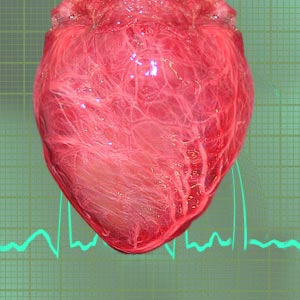Ischemic Heart Disease

Ischemic heart disease is a condition caused by lack of blood supply to the heart. The deposition of cholesterol plaque narrows or blocks the blood vessel thereby reducing the supply of oxygen and nutrients to the heart musculature. These nutrients are essential for proper functioning of heart. As a result this condition may eventually deprive blood supply to the portion of heart leading to heart attack.
Heart pumps out the oxygenated blood supply to the various parts of the body and any defect in the functioning of heart will affect all the vital organs of the body. The death of the tissue in these organs leads to the eventual organ failure. Learn more about what factors cause this heart condition and how to detect it.
Causes of Ischemic heart disease
There are multiple factors responsible for the causes of Heart disease. Major risk factors are smoking, diabetic mellitus and cholesterol levels.
- Hypercholesterolemia - condition of elevated cholesterol levels.
- Hypertension
- Genetic
- Stress
- Overweight
- Poor nutrition or too much fat in the diet
- Previous heart attack or stroke.
- Low level of HDL(hyper-density lipoprotein)
Signs and symptoms of ischemic heart disease
An early stage of the Ischemic disease however, shows no symptoms. The first sign of symptoms is the severe pain in the central part of the chest due to myocardial infraction. Warning symptoms occur in number of patients in the form of Angina Pectoris. These symptoms may start with pain in the central part of the chest and gradually radiate towards the jaws or the back. The distinct feature of these pains is that it is aggravated by exercise and relieved by rest.
This pain is caused due to the sense of compression or tightness in the middle of the chest and usually accompanied by sweating. Most of the symptoms can be examined on a clinical examination like presence of Tendon Xanthomas, thickening of the Achilles tendon and Arcus lipidus. Along with it, the patient should be examined for obesity, thyroid, diabetics and peripheral vascular disease.
Diagnosis of Ischemic heart disease
Diagnosis can be based on the level of chest pain and discomfort caused by exertion. The conformation of the diagnosis can be done observing the reversible Ischemic changes on ECG during the attack or by giving the test dose of sub lingual nitroglycerin which relieves the pain subsequently in one or two minutes. Certain tests are performed to know the severity and extend of the Ischemic heart disease. Various diagnostic tests done include:
- Electrocardiogram- measures electrical activities of heart
- Echocardiogram- measures sound waves of heart
- Exercise-tolerance test.
- Thallium stress test
- Blood test
- Cholesterol and lipoprotein test
- X-ray of chest
- Coronary angiogram
Treatment for Ischemic heart disease
Treatment involves various drug therapies with nitrates which dilate the diseased coronary arteries and effectively relieve the pain in few minutes. Drugs like Isosorbide Dinitrate and Isosorbide Mononitrate are used for this purpose. Thrombolytic agents are prescribed to dissolve clots.
A tablet of nitroglycerin placed under the tongue or usage of oral spray relieves the angina within few minutes. Beta-blockers like propranolol are effective pain relievers to reduce the myocardial oxygen supply by decreasing the heart rate.
Calcium channel antagonist produces vasodilatation and thereby results in reduced excitability and conductivity of cardiac muscle. Verapamil, diltiazem and other calcium antagonists are used in conjunction with beta blockers to prevent episodes of tachycardia.
Aspirin, an anti-platelet drug prevents clumping of blood vessels. This results in reduced formation of clots on fatty plaques, which can block the artery and result in heart attack. People who are allergic to aspirin are treated with other alternatives medications like Ticlopidine or Clopidogrel Bisulphate.
Surgical therapy are included when the main treatment have proved fatal.
Coronary Angioplasty results in dilating the blocked vessel by inflating a balloon inside the vessel.
Coronary Artery Bypass Grafting replaces the blocked area of vessel using a graft from the patient.
It is possible to live a healthy normal life with proper treatment and care. Good control of dietary habits and cholesterol levels significantly improves the outlook.
Top of the Page: Ischemic Heart Disease
Tags:#Ischemic Heart Disease
Women's Heart Attack Symptoms
Women Heart Disease Statistics
Heart Disease Risk Calculator
Reverse Heart Disease
Ischemic Heart Disease
Framingham Heart Study Risk
Hypertension Primary Pulmonary
Low Blood Pressure High Pulse
Managing High Blood Pressure
Cholesterol Levels for Women
Endothelial Dysfunction
Other health topics in TargetWoman Women Health section:
General Women Health

Women Health Tips - Women Health - key to understanding your health ...
Cardiac Care
Women's Heart Attack Symptoms - Identify heart problems...
Skin Diseases
Stress Hives - Red itchy spots ...
Women Disorders
Endocrine Disorder - Play a key role in overall wellbeing ...
Women's Reproductive Health
Testosterone Cream for Women - Hormone replacement option ...
Pregnancy
Pregnancy - Regulate your lifestyle to accommodate the needs of pregnancy ...
Head and Face
Sinus Infection - Nearly 1 of every 7 Americans suffer from ....
Women and Bone Care

Slipped Disc - Prevent injury, reduce pain ...
Menstrual Disorders
Enlarged Uterus - Uterus larger than normal size ...
Female Urinary Problems
Bladder Problems in Women - Treatable and curable ...
Gastrointestinal Disorders
Causes of Stomach Ulcers - Burning feeling in the gut ...
Respiratory Disorders
Lung function Test - How well do you breathe ...
Sleep Management

Insomnia and Weight Gain - Sleep it off ...
Psychological Disorders in Women
Mood swings and women - Not going crazy ...
Supplements for Women
Women's Vitamins - Wellness needs...
Natural Remedies

Natural Diuretic - Flush out toxins ...
Alternative Therapy
Acupuncture Point - Feel the pins and needles ...
Top of the Page: Ischemic Heart Disease
Popularity Index: 100,524

